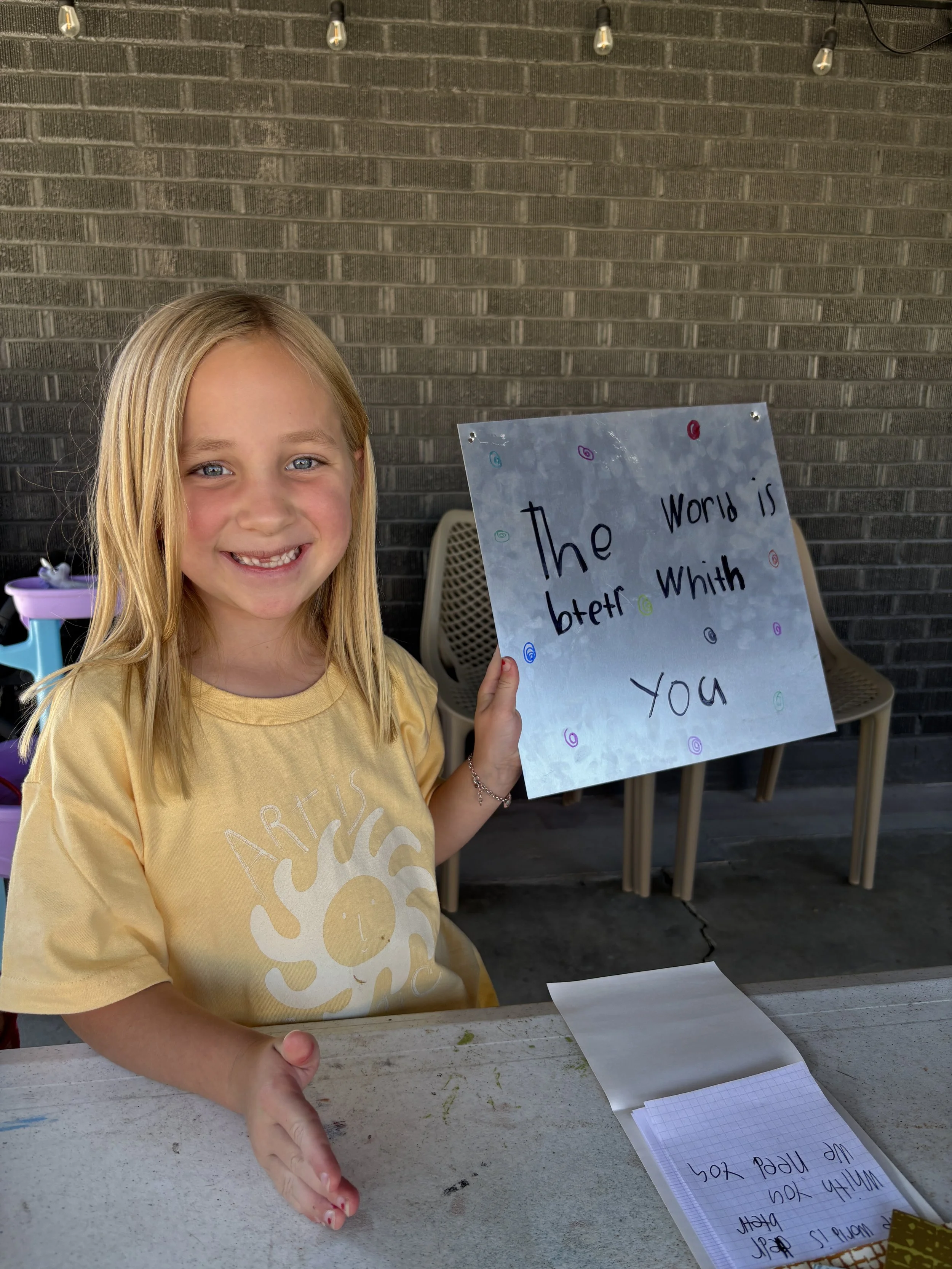The joys of analog and finding comrades.
My niece with her radical street art!
In a time when democracy feels fragile and our screens seem designed to divide us, I've been thinking about what revolutionary response looks like. Recently, I've experienced the seemingly simple choice to show up and be present in intentional spaces with people who have a shared interest and bring tender hopes.
These are three wildly different gatherings that impacted me and reminded me what analog resistance looks like in practice.
Dinner party turned micro revolution. The first was a dinner party among colleagues, hosted by a mutual friend. Six of us around a table sharing homemade food and the slow, meandering conversation without the pressure of time. Probably two-thirds of the way through the evening, general introductions had turned to deeper conversations of life and thoughtful questions evoking vulnerable responses. Many shared stories of previous times in their life they had faced seemingly intractable problems. In this case, being diagnosed with HIV when there was no treatment and crushing stigma surrounded every aspect of their lives. Beyond enduring, people created knowledge through relationship and built networks of care when institutions failed them. We surmised at the end of the evening that resilience isn't individual grit – it's collective wisdom, passed hand to hand, story to story. Their analog resistance to despair became a laboratory for a revolutionary love, a model of care.
Workshop on offline tactics turned connection incubator. The second was a workshop on organizing tactics was medicine for an algorithm-addled world. We learned about and practiced human-to-human connection as bridge-building across difference. We explored the development of pods – small, trusted groups – as the antithesis to our current binary of hyper-connectivity and profound loneliness. No notifications, no engagement metrics, just the seemingly retro act of looking each other in the eye and saying: "Your liberation is bound up with mine."
Art turned power to the people. The third was peak summer joy: making art with my young nieces, who wanted to create LoveYou2 signs. I brought stencils in my suitcase and we secured spray paint. As we sat in their backyard planned our pieces, I was delighted to discover my young niece already had her own vision: "The world is better with you." She practiced sketching it out before creating her masterpiece with paint pens. But her street art soul truly came alive when she tried the spray paint and stencils – the ritual shake of the can, the unabashed joy of feeling paint explode onto a found canvas. Here was intergenerational analog resistance: choosing creation over consumption, choosing collaboration over isolation.
These three experiences reminded me—small groups gathered around shared interests become laboratories for a different way of being. Whether it's sharing survival strategies from another era, learning and building skills, or slowing down to create art; we are cultivating analog resistance to the forces that want us disconnected, suspicious, and small.
This resistance practiced over and over transforms into resilience. When we show up authentically in these intimate spaces, we remember what algorithms can't replicate: the power of presence, the wisdom that lives in our bodies and stories, the creative that emerges when we make things together rather than simply consume them separately.
In our current political moment – with democracy under threat and division weaponized – this feels revolutionary. Not because it's dramatic, but because it's sustainable. Because there is growth, there is joy. Because it builds the relational infrastructure we'll need for whatever comes next.
The question becomes: What small gathering could you treasure and cultivate? What small group of fellow travelers might become your analog resistance cell?
Maybe it starts with something as simple as love notes. I've learned that writing them together – whether at kitchen tables or community centers – creates immediate intimacy. People share what they need to say but haven't found the words for. Strangers become comrades through the simple act of witnessing each other's tenderness.
Love note templates in six languages are available at LoveYou2.org – the perfect way to begin seeding this analog resistance. Because sometimes revolution looks like spray paint cans shaking and sometimes it looks like careful handwriting on small pieces of paper. Either way, it's about finding our fellow analog comrades and saying: "The world is better with you."
What small gathering will you create this week?
